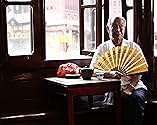Focuses on the people, their stories and architecture spanning from the mid-1800s, when Shanghai was opened as a trading port, to the present day.Focuses on the people, their stories and architecture spanning from the mid-1800s, when Shanghai was opened as a trading port, to the present day.Focuses on the people, their stories and architecture spanning from the mid-1800s, when Shanghai was opened as a trading port, to the present day.
- Awards
- 3 wins & 4 nominations
Michelangelo Antonioni
- Self
- (archive footage)
Yindi Cao
- Yuehong Xing
- (archive footage)
Hsin-i Chang
- Self
- (as Chang Hsin-I)
Ming-yi Fei
- Self
- (as Barbara Fei)
Baomei Huang
- Self
- (as Huang Baomei)
Chia-Tung Lee
- Self
- (as Lee Chia-Tung)
Tony Leung Chiu-wai
- Self
- (archive footage)
- (as Tony Chiu Wai Leung)
Yunzhu Shangguan
- Shuihua Shang
- (archive footage)
Xiao-he Wang
- Self
- (archive footage)
- Director
- Writer
- All cast & crew
- Production, box office & more at IMDbPro
Storyline
Did you know
- TriviaA longer version premiered at the Cannes Film Festival at 218 minutes. It's unknown if director Jia Zhangke will ever release this version.
- ConnectionsFeatures Chung Kuo: China (1972)
Featured review
Director Jia Zhang-ke was commissioned to make a film commemorating last year's Shanghai World Fair. Population-wise, Shanghai is the biggest city in China. It sits at the mouth of the giant Yangstze River, and is therefore a major port. In 1842, the Treaty of Nanking opened Shanghai to foreign trade. And the city boomed. Shanghai suffered a decline in influence when the Communists came to power in 1949, but rose once again in 1990, when then Premier Deng Xiaoping introduced economic reforms in 1990. When my wife and I stayed with a friend living in Shanghai, it was impossible not to see that Shanghai was booming like never before. One sixth of the world's cranes it was said, crowded the city's skyline. Everywhere one looked, buildings were being razed to the ground to make way for newer, taller structures. In a city with nearly 17,000,000 people, the crowds were like nothing we'd ever experienced before. The traffic wasn't much better. However, the overall impression we took away with us was of a city that was thriving, achieving and vital Jia Zhang-ke's film "I Wish I Knew" has been described as a 'melancholic history of Shanghai", from the brutalities of the Japanese occupation, right up till the present day. Unfortunately, this film in no way gives a person watching this film the impression that Shanghai is one of the most powerful cities in the world. There was scarcely a mention of Japanese occupation Instead, we are subjected to no less than eighteen people sitting around and recounting their memories, more of their family lives than of Shanghai itself. For the most part, these people's memories were mundane and tedious. Then there was the young woman wandering around The Bund, or walking in the rain – why? Who knows, as it's never explained? Granted, things don't have to be spelled out in black and white, but for the life of me, I couldn't see the point. This film is devoid of the sense of a city on the move. The cinema-photography seemed to me well, to be blunt about it, rather amateurish with far too much "framing" The subtitling was truly woeful, with most of the background being pale, the white subtitles were often mainly impossible to read. Footage of Shanghai as it once was to me virtually non-existent and the feel of the city as if it was to me, was also virtually non-existent, too. Overall, this film was an opportunity missed, a perfect illustration of a chance squandered.
Details
Box office
- Gross worldwide
- $16,307
- Runtime1 hour 56 minutes
- Color
- Sound mix
- Aspect ratio
- 2.20 : 1
Contribute to this page
Suggest an edit or add missing content



























